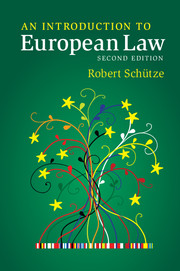Book contents
- Frontmatter
- Dedication
- Summary Contents
- Contents
- List of illustrations
- List of tables
- Acknowledgements
- Table of cases
- List of abbreviations
- Introduction
- Part I European Law: Creation
- 1 Union Institutions
- 2 Union Legislation
- 3 Union Competences
- 4 Fundamental Rights
- Part II European Law: Enforcement
- Part III European Law: Substance
- Appendices
- Index
2 - Union Legislation
from Part I - European Law: Creation
- Frontmatter
- Dedication
- Summary Contents
- Contents
- List of illustrations
- List of tables
- Acknowledgements
- Table of cases
- List of abbreviations
- Introduction
- Part I European Law: Creation
- 1 Union Institutions
- 2 Union Legislation
- 3 Union Competences
- 4 Fundamental Rights
- Part II European Law: Enforcement
- Part III European Law: Substance
- Appendices
- Index
Summary
Introduction
British constitutionalism defines (primary) legislation as an act adopted by the Queen-in-Parliament. Behind this “compound” legislator stands a legislative procedure. This legal procedure links the House of Commons, the House of Lords and the monarchy. European constitutionalism also adopts a procedural definition of legislative power. However, unlike British constitutional law, the Treaties distinguish two types of legislative procedures: an ordinary legislative procedure and special legislative procedures. Article 289 TFEU states:
1. The ordinary legislative procedure shall consist in the joint adoption by the European Parliament and the Council of a regulation, directive or decision on a proposal from the Commission. This procedure is defined in Article 294.
2. In the specific cases provided for by the Treaties, the adoption of a regulation, directive or decision by the European Parliament with the participation of the Council, or by the latter with the participation of the European Parliament, shall constitute a special legislative procedure.
European “legislation” is thus – formally – defined as an act adopted by the bicameral Union legislator. According to the ordinary legislative procedure, the European Parliament and the Council act as co-legislators with symmetric procedural rights. European legislation is therefore seen as the product of a “joint adoption” by both institutions. But the Treaties also recognize special legislative procedures. The defining characteristic of these special procedures is that they abandon the institutional equality between the European Parliament and the Council. Logically, then, Article 289(2) TFEU recognizes two variants. In the first variant, the European Parliament acts as the dominant institution, with the mere “participation” of the Council in the form of “consent”. The second variant inverts this relationship. The Council is here the dominant institution, with the Parliament either participating through its “consent”, or in the form of “consultation”.
Having analysed the various Union institutions in Chapter 1, this Chapter explores their interaction in the creation of European (secondary) law. Sections 1 and 2 respectively discuss the ordinary and special legislative procedures in more detail.
- Type
- Chapter
- Information
- An Introduction to European Law , pp. 39 - 64Publisher: Cambridge University PressPrint publication year: 2015



